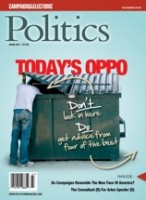Here’s Sarah Palin’s farewell speech from this weekend.
Here’s William Shatner giving the beginning of the speech a poetic twist on last night’s Tonight Show.
Here’s Sarah Palin’s farewell speech from this weekend.
Here’s William Shatner giving the beginning of the speech a poetic twist on last night’s Tonight Show.
That distinction belongs to Richard Nixon’s “I am not a crook” fiasco. For using the bully pulpit to bully yourself, Nixon’s noxious self-nailing ranks as a gold medal performance unlikely ever to be equaled. But President Obama’s outing last week surely takes the silver. By Sunday, Rasmussen was reporting that 40 percent of likely voters… 40 percent… voiced strong disapproval of the President (versus 29 percent who strongly approve). What happened?
Some of it was Mr. Obama’s incredible blunder about the Harvard professor and the Cambridge police officers. As National Public Radio’s Juan Williams has said, the President called into question his role as a racial healer, one of the most appealing promises of his election. But by the time he took that final question of the evening, he had already failed in his main mission, to boost his health reform initiative.
When it came to health care, throughout the evening the President protested too much and offered little beyond assertion to build his case. The effect was to confirm a skeptical public’s fears that his version of health reform is a breathtaking budget buster that would end up taking away current coverage that polls show most of us want left untouched. In this context Mr. Obama’s disclaimers about tax increases became entirely unbelievable. And as others have pointed out, talk about focusing doctors on what works suggested that government designees would step firmly between doctors and patients once Congress gave the green light. Read More
Recognizing the escalating concern about his remarks in reference to the Cambridge, Massachusetts, police department during Wednesday’s press conference, President Obama went to the briefing room this afternoon to announce that he’d just spoken with James Crowley, the officer at the center of the story, and to acknowledge that he had probably gone too far in saying police had “acted stupidly.”
All in all, it was the right thing for the president to do. Yet his brief remarks showed Mr. Obama at his best and his not so best.
Best: Addressing the issue with some candor and humor, signaling that he goofed, and explaining that while questions remain about how everything transpired when Henry Louis Gates was arrested, the issue of police overzealousness is a sensitive one for black Americans – and understandably so.
Not so best: He just couldn’t quite get to the point of saying, “Yeah, I screwed up on this one.” Instead, he danced around what everyone knew he should have said. Read More
At Wednesday night’s press conference, President Obama sought to get to the heart of Americans’ concerns about health care:
I realize that with all the charges and criticisms that are being thrown around in Washington, a lot of Americans may be wondering, “What’s in this for me? How does my family stand to benefit from health insurance reform?” So tonight I want to answer those questions.
Last night, at a fundraiser in Chicago, Obama was less comfortable with Americans analyzing issues from a self-interested perspective:
The team of the United States of America has to come together and make some plays for each other. Not think about ‘I,’ not think about ‘what’s in it for me.’ Let’s figure out how to move this country forward, Chicago.
He also executed a nice combo of the strawman AND the lazy Washington Read More
The big health care presser wasn’t the only press conference President Obama held Wednesday. Earlier in the day he held a joint press conference in the Rose Garden with Prime Minister Nouri al Maliki of Iraq.
It was brief – just one question on each side – but each leader said something important.
President Obama continued his admirable policy of recognizing that the situation in Iraq is vastly improved – and giving credit to the American forces who made it possible. He also, appropriately, abandoned the previous, bizarre Democratic tactic of blaming Iraqi leaders for not getting their fledgling country into shape sooner. And he shifted firmly into looking-ahead mode, making clear that the US and Iraq will deepen their alliance:
The United States and Iraq have known difficult times together. Now both of us agree that the bonds forged between Americans and Iraqis in war can pave the way for progress that can be forged in peace….. [T]ogether, Americans and Iraqis can expand economic cooperation and trade that opens new doors of opportunity. Together, we can broaden our educational, our cultural, and scientific engagement to make a positive difference in the lives of our people. And together, we can take steps to advance security and prosperity throughout the region, and around the globe.
Sure, President Obama’s remarks emanated a sense of “forcing the spring” in terms of Iraq’s peaceful future. But that’s to be expected. The president is surely grateful this issue is largely off his plate.
It was Prime Minister Maliki, though, who reminded us how extraordinary this meeting was: Read More
Any doubt that Republicans (and conservative Democrats) are winning the argument over health care reform was erased within moments of President Obama opening his mouth at tonight’s press conference. While delivering his opening statement, the president looked and sounded chastened – like the teacher’s pet who got unexpectedly scolded in front of class.
The president had no swagger, and he jettisoned some of the rhetorical tics that frequently enter his speeches – the strawman, the goldilocks, the me-me-me.
Instead, President Obama made a rather direct and brief appeal to the public – an appeal that was all the more effective for being so direct and brief.
The big theme: Everyone will benefit from health reform. The president dwelled less on the uninsured and more on the insured – the 85 percent of the public many on the left forgot about in recent weeks. Read More
 Clark Judge, Ed Walsh, Jeff Nussbaum and I recently had the pleasure of sitting down to lunch with the editors of Politics magazine (formerly known as Campaigns and Elections) for a lively, on-the-record discussion for the magazine’s “Shop Talk” section.
Clark Judge, Ed Walsh, Jeff Nussbaum and I recently had the pleasure of sitting down to lunch with the editors of Politics magazine (formerly known as Campaigns and Elections) for a lively, on-the-record discussion for the magazine’s “Shop Talk” section.
We’ll post a link to that article when it comes out in a month or two, but in the meantime, I wanted to draw attention to the “Shop Talk” feature, which you can check out on their archives page, here. It’s a wonderful glimpse into the many roles played by professional campaigners and consultants.
It’s also fun to see the different jargon use by different political pros. Opposition researchers pity “javelin catchers,” fundraisers brag about dollar transfer, and ad gurus worry about whether to buy 800 or 1400 “points of TV.”
As speechwriters, Clark, Ed, Jeff, and I endeavored to keep our own “shop talk” jargon-free! But hopefully readers will enjoy it on the page as much as we all did in person.
Here is a sentence unsurpassed in American historical writing for its poetic power and its intimations of moral and philosophic depth: “No political contest in history was more exclusively or passionately concerned with the character of the beliefs in which the souls of men were to abide.”
The author was Claremont professor Harry Jaffa. The source was The Crisis of the House Divided, published in 1959. Jaffa is considered perhaps the greatest living American historian and Crisis the greatest book on Abraham Lincoln ever written. The political contest in question was the U.S. senate race between Lincoln and Stephen Douglas. The focus of Crisis is the Lincoln-Douglas debates.
A (to-date) masterful interview with Jaffa appears this week on Uncommon Knowledge with Peter Robinson, posted at NationalReview.com under the “NRO Radio & TV” pulldown tab. From Monday to Friday, NRO will put up a new segment daily. In today’s segment (the second), Jaffa responds to Robinson’s reading of the sentence above by explaining the philosophic foundations of American exceptionalism. In Monday’s segment, Jaffa told how the Lincoln and Douglas contended over exactly the same issue that was at stake in the first book of Plato’s Republic. I understand that another week of postings from the same taping will go up on NRO sometime in the next month.
If you care, as I do, about American political discourse and consider it the vehicle through which our national purpose is discovered and developed, you MUST watch this program. If the momentum of the first two segments is maintained, you will find yourself remembering that the “character of the beliefs in which the souls of men… abide” is the enduring question of our public dialogue and the reason so many of us can find that dialogue so enthralling.
Under the category of “never waste an opportunity to point out what a dope Sarah Palin is,” Vanity Fair edits her resignation announcement “to whip it into publishable shape.”
Which would be awesome if Sarah Palin had written a piece for Vanity Fair. But she made a speech to the people of her state and to millions of plain-speaking people around the country who find her to be a breath of fresh air in an otherwise insufferable political atmosphere.
Executive literary editor Wayne Lawson’s mark-up indicates he’s someone who hasn’t written many speeches. He turns shorter sentences into longer ones, sees no need for phrases such as “commonsense, conservative choices,” and suggests replacing a “So” with a “Therefore.” Most importantly, he violates rule number one of speechwriting by demonstrating no interest in how his speaker actually wants to express herself.
I’m sure Sarah Palin’s speech could have been improved; almost every speech can be. But I’m also sure Sarah Palin made the right call by directing her speech to Alaskans and not to the Vanity Fair cocktail party circuit.
 How would the media cover the moon landing today? This video gives a taste. The Wolf Blitzer moment is priceless.
How would the media cover the moon landing today? This video gives a taste. The Wolf Blitzer moment is priceless.
Here’s House Speaker Nancy Pelosi explaining to Politico why she wants to lift the income level at which the proposed surtax to pay for a government takeover of health care would kick in:
“I’d like it to go higher than it is,” Pelosi said Friday.
The speaker would like the trigger raised to $500,000 for individuals and $1 million for families, “so it’s a millionaire’s tax,” she said. “When someone hears, ‘2,’ they think, ‘Oh, I could be there,’ because they don’t know the $280,000 is for one person.
“It sounds like you’re in the neighborhood. So I just want to remove all doubt. You hear ‘$500,000 a year,’ you think, ‘My God, that’s not me.’”
In other words, the only way to pass this trillion-dollar proto-socialist extravaganza is if no one thinks they have to pay for it! And the only people who will have to pay for it are the people who will receive absolutely no benefit from it.
And that’s the way it is with Democrats in control of Washington.
The Obama White House is learning the limits of communications.
According to Rasmussen, the President’s approval rating have shrunk to about where they were on Election Day: 52 percent favorable, 47 percent unfavorable. The difference between Mr. Obama’s highly favorable number and highly unfavorable is now negative seven percent. Looking at the charts of public opinion survey results, it appears that the President went into a steep slide about when he started to make health care reform his top issue.
The President’s campaign for reform has been impressive, what with eloquent presidential speeches, town hall meetings that featured moving (if pre-arranged) stories from effective (if pre-approved) citizens, and ABC News devoting a prime time segment in support of the White House. I am in Ohio today, and ads supporting the President’s initiative are all over the TV.
Yet again according Rasmussen (which was rated the most accurate national pollster after both the 2004 and 2008 elections), half the country now opposes the program’s centerpiece, the public option. Meanwhile, today’s Wall Street Journal lead front-page headline announced even more bad news about the reform proposals and the budget. What was the estimated cost? As of a few weeks ago, north of $1 trillion. But, today’s Journal reports that the Congressional Budget Office has just found that the proposals on the table would make health cost inflation worse, exactly the opposite of what advocates including the President have maintained. Perhaps worst of all, polls are showing fast fading public interest in the issue generally.
My point is that the public appears not to be responding to the tsunami of White House communications. It may, in fact, be souring on the President himself as a result of the campaign.
We’ve heard a lot about past health care overhaul failures. There are some ideas that even the most skilled communicators can take to the American people and come up with no sale. As things look today, anything that smacks of a major shaking up of how Americans receive their health care could contend for top place on that list.
I’m not surprised that Paul articulated my point about the wider implication of the Miller/Obama student loan proposal even better than I could.
As Paul says, the federal government has long paid a subsidy to private loan providers in the Federal Family Education Loan (FFEL) program. That’s because banks incur costs when they originate and service loans and the federal government wants banks to give loans to everyone. The government used to acknowledge that the banking industry has some expertise in banking that federal bureaucrats do not.
No such recognition exists today. The federal subsidies on loans were the proverbial camel’s nose under the tent of the private lending industry. Then came the Direct Loan program, created when the federal government decided it could save some money by distributing funds directly to schools (even if it meant fewer options for students). And after that it was an easy step to “Why don’t we just directly finance all loans and the banks can work for us.”
Sound familiar? Paul rightly points out that the federal government has already nosed its way into the health care tent through Medicare and Medicaid. Next step: a program that acts like insurance but is run by the government. Step after that: “Why don’t we just put everyone on our insurance (and health care providers can work for us).” Read More
New Haven firefighters Frank Ricci and Ben Vargas spoke at Judge Sonia Sotomayor’s confirmation hearing Thursday.
But why?
Commentators across the board remarked that Ricci’s and Vargas’s statements were moving and emotional. Surely everyone could empathize with their situation — denied promotions they deserved and initially denied redress in the courts.
But I thought we were trying to get away from empathy in the judicial system?
Mr. Ricci and Mr. Vargas don’t know anything about Judge Sotomayor that the rest of us don’t know. Their interaction with her is limited to the brief judgment she and her colleagues issued in disposing of their case. And they can’t offer any insight into how appropriately Judge Sotomayor applied the law.
The only possible value the men’s testimony could have is to dredge up feelings and emotions about whether racial discrimination is a two-way street — to get senators and the public to empathize with their plight and use that empathy to influence their opinion of Judge Sotomayor.
By the Republican standard expressed in these hearings, Judge Sotomayor would have been forbidden from considering such feelings in rendering her decision. Republicans should have held themselves to the same standard.
 More from my West Wing Writers colleague David Litt:
More from my West Wing Writers colleague David Litt:
Our more cultured readers will recognize the title as the tagline from the 2004 classic, Alien vs. Predator. But it’s also what popped into my head when I thought about the public debate over Supreme Court justices. Here’s why.
When George W. Bush was president, he did a great job of framing the debate on his terms: Liberal Activists vs. Conservative Constructionists. As a Democrat, entering that debate was like having to choose the Alien or the Predator. Whoever wins, we lose.
I wanted to look at Sotomayor’s confirmation hearings to see if the frame has changed. I think it has. In fact, we’ve seen three competing frames at work over the last few days. In the order of best to worst, from a Democrat’s perspective, here they are.
Obama: Caring vs. Uncaring
This is the Alien vs. Predator scenario for Republicans. Liberals have a heart, conservatives don’t. That’s why Republicans are so concerned about “empathy” as a standard for future justices.